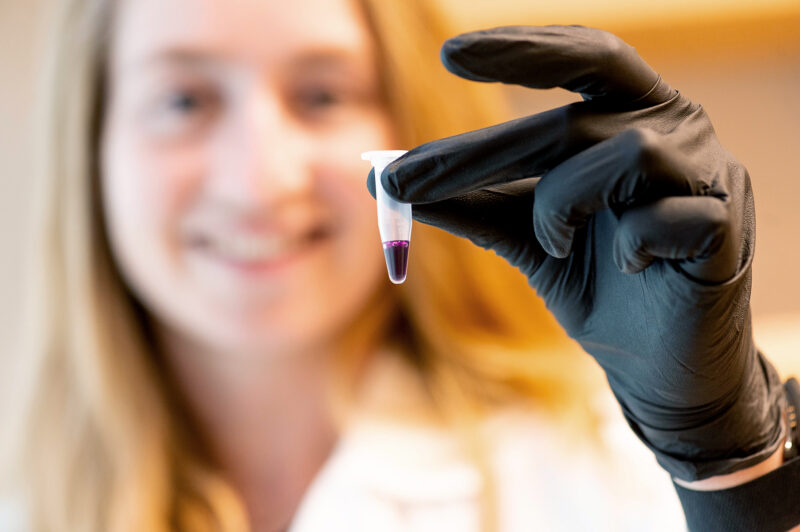Awards and recognition
Dr. Anna Blakney Receives MSFHR Scholar Award
 Congratulations to Dr. Anna Blakney for receiving a 2021 Michael Smith Foundation for Health Research (MSFHR) Scholar Award for her work with RNA vaccines and therapies. This MSFHR award aims to support early career researchers in developing their own research teams and programs in cutting edge healthcare solutions. This annual award will contribute $90,000 for five years towards expanding her research team working on a monoclonal antibody project in her lab at the Michael Smith Laboratories.
Congratulations to Dr. Anna Blakney for receiving a 2021 Michael Smith Foundation for Health Research (MSFHR) Scholar Award for her work with RNA vaccines and therapies. This MSFHR award aims to support early career researchers in developing their own research teams and programs in cutting edge healthcare solutions. This annual award will contribute $90,000 for five years towards expanding her research team working on a monoclonal antibody project in her lab at the Michael Smith Laboratories.
“It’s exciting to receive this funding so early on because it will allow us to ramp up this project by hiring more people to work on it. Building a larger team around this project will greatly further its development, especially as I foresee this being a longer-term project for my lab,” reflects Dr. Blakney.
Project title: Antibody therapies encoded in self-amplifying RNA (saRNA)
Project Abstract: Antibody therapies have revolutionized modern medicine: they offer highly specific and effective treatments, with applications in oncology and rare diseases. The drawback of current antibody therapies is that they are expensive and must be administered intravenously, which limits widespread use. RNA-based gene therapy is a potential way to encode antibodies to make these treatments more universally affordable and accessible. For example, RNA-based gene therapy is used in the leading COVID-19 vaccines because it is easy to produce rapidly and cost-effectively at large scales. While RNA vaccines or protein replacement therapies have been widely investigated, the application to RNA-encoded antibodies is still in the early development phase. The main challenge is delivering sufficient amounts of RNA to target cells and ensuring the duration of antibody expression is therapeutically relevant. We aim to use self-amplifying RNA (saRNA), a type of RNA that replicates itself in cells, to encode antibodies. saRNA results in higher protein expression than normal RNA using a lower dose of RNA. We hypothesize that by optimizing the formulation saRNA will enable a low-cost, easily administered approach to antibody therapy.
A recently appointed Assistant Professor to both UBC’s Michael Smith Laboratories and the School of Biomedical Engineering, Dr. Blakney is eager to expand the work her team is already doing in the RNA therapy space. As early as the 1990s, research began on using RNA molecules as medical treatments. Fellow UBC researcher Dr. Peter Cullis and his lab got past the lipid nanoparticular barrier (creating a delivery system for the RNA) and helped to breakthrough this scientific field. Building on the legacy of people like Cullis, Dr. Blakney aims to use this project to gain an understanding of the potential of saRNA antibody treatments for a variety of applications.
“This project will help build our understanding how well this technology actually works, what the best design is and what are the questions that we still need to answer. Essentially our work will function as a proof of concept for an RNA antibody treatment.”
“The idea is to use saRNA to encode these monoclonal anitbodies and produce more in your body. Similar to the way RNA vaccines work to recruit your cells to produce more proteins, we would be able to give a patient an injection of saRNA that encodes the antibodies, then the patient’s body acts as the bioreactor and makes the monoclonal antibodies. This would result in a much lower treatment cost. And hopefully we could offer this treatment via intramuscular injection instead of through an IV.”
 Current monoclonal antibody therapies, like ones used to treat cancer, are very expensive (often upwards of $10,000 per round) and require very specialized technology and equipment. They are also time consuming for the patient and healthcare team, requiring an IV to administer them, presenting several barriers to treatment. Dr. Blakney hopes her research with saRNA antibody therapies will change the treatment landscape for the better.
Current monoclonal antibody therapies, like ones used to treat cancer, are very expensive (often upwards of $10,000 per round) and require very specialized technology and equipment. They are also time consuming for the patient and healthcare team, requiring an IV to administer them, presenting several barriers to treatment. Dr. Blakney hopes her research with saRNA antibody therapies will change the treatment landscape for the better.
“It’s very exciting to think about where the field of RNA is going next. We’ve seen that it works really well for vaccines, but what are the other niches or applications where this technology can really make a difference and help us create better medicines?”
Ultimately, the hope is to expand this medical technology to treat a variety of maladies. saRNA treatments could be used to as alternative cancer treatments, compliments to vaccine strategies for outbreaks (providing short-term, rapid protection), and could be effective alternatives for people who can’t get COVID-19 and other vaccines due to allergies or adverse reactions. The promising widespread application of this research keeps Dr. Blakney’s team pushing forward in their research.
Learn More:
- View the full list of recipients of the MSFHR Scholar Award
- Learn more about the MSFHR Scholar Program
- Read the MSFHR award announcement